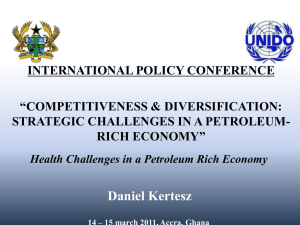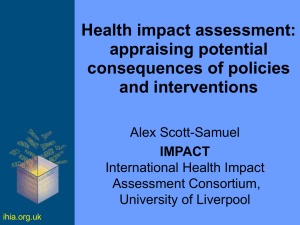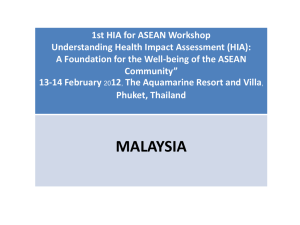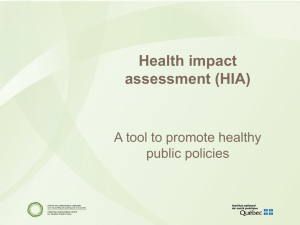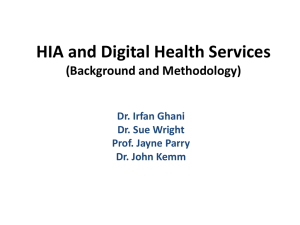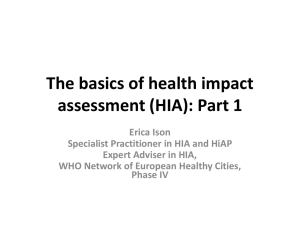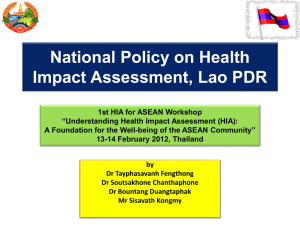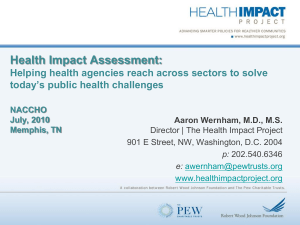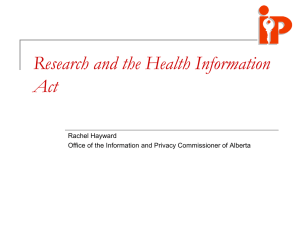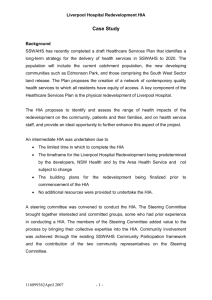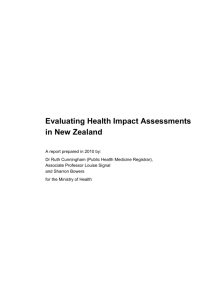Health Impact Assessment - The Pew Charitable Trusts
advertisement
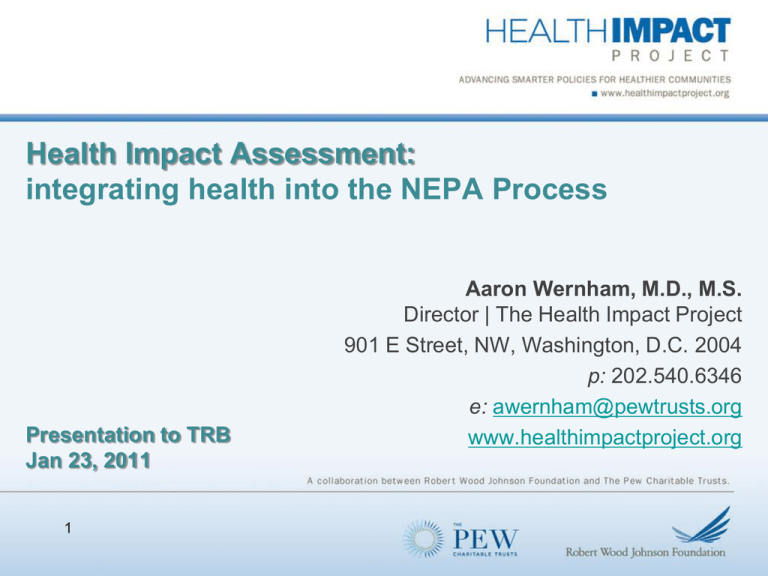
Health Impact Assessment: integrating health into the NEPA Process Presentation to TRB Jan 23, 2011 1 Aaron Wernham, M.D., M.S. Director | The Health Impact Project 901 E Street, NW, Washington, D.C. 2004 p: 202.540.6346 e: awernham@pewtrusts.org www.healthimpactproject.org Outline of talk • Legal foundations: how should agencies approach health in NEPA analyses? • Introduction to Health Impact Assessment (HIA), and its use in the context of NEPA • Applications of HIA to transportation decisions Health analysis in NEPA Current practice 1. Survey of 45 EIS: - No discussion of health in 83% In the remainder, discussion of health limited to singlesubstance cancer risk assessment Steinemann, A. 2000. Rethinking Human Health Impact Assessment. Environmental Impact Assessment Review 20: 627-645 2. Survey of NEPA professionals: - Found little understanding, discussion, or analysis of health among EIS professionals Cole et al. 2004. Prospects for Health Impact Assessment in the United States: New and Improved Environmental Impact Assessment of Something Different? Journal of Health Politics, Policy, and Law 29 (6) 1153-1186 Health analysis in NEPA Typical practice 1. Assessment of air and water quality impacts is common: while health impacts are implied, they are rarely analyzed. 2. Single-substance risk assessments are sometimes undertaken. 3. Rare to look at the public health baseline or identify subgroups that are vulnerable to specific impacts. 4. Rare to look at indirect or cumulative health effects. The “Determinants of Health” Graphical representation “Get more exercise”... “I never thought of this as a health issue” Car-friendly communities have almost double the rate of obesity as pedestrian-friendly communities Access to public parks and recreational facilities has been linked to reductions in crime and juvenile delinquency, and violent injury. An E-Z Pass toll system reduced rates of premature birth. NEPA and Human Health: Purpose The purposes of this Act are: … to promote efforts which will prevent or eliminate damage to the environment and biosphere and stimulate the health and welfare of man; to enrich the understanding of the ecological systems and natural resources important to the Nation; and to establish a Council on Environmental Quality NEPA Sec. 2 [42 USC § 4321] CEQ Regulations and Guidance 40 C.F.R. 1508.8 Effects: “Effects” includes ecological, aesthetic, historic, cultural, economic, social, or health, whether direct, indirect, or cumulative.” 40 C.F.R. 1508.27 Significantly: (b) Intensity: includes “ The degree to which the proposed action affects public health or safety.” “Agencies should recognize the interrelated cultural, social, occupational, historical, or economic factors that may amplify the natural and physical environmental effects of a proposed agency action.” CEQ (1997) Environmental Justice: guidance under NEPA 9 Congressional Intent…? “When we speak of the environment, basically, we are talking about the relationship between man and these physical and biological and social forces that impact upon him. A public policy for the environment basically is not a public policy for those things out there. It is a policy for people." Senator Henry Jackson. Hearings on S. 1075, S. 237, and S. 1752, Senate Committee on Interior and Insular Affairs, 91st Cong., 1st Session. 118 (1969) Executive Orders Each Federal agency shall: make achieving environmental justice part of its mission by identifying and addressing, as appropriate, disproportionately high and adverse human health or environmental effects of its programs, policies, and activities on minority populations and low-income populations in the United States Executive Order 12898: Federal Actions to Address Environmental Justice in Minority Populations and Low-Income Populations (11 February 1994) …make it a high priority to identify and assess environmental health risks and safety risks that may disproportionately affect children; and ... shall ensure that its policies, programs, activities, and standards address disproportionate risks to children that result from environmental health risks or safety risks. Executive Order 13045: Protection of Children from Environmental Health Risks and Safety Risks HIA: Definitions A combination of procedures, methods and tools that systematically judges the potential effects of a policy, programme or project on the health of a population and the distribution of those effects within the population. HIA identifies appropriate actions to manage those effects. (IAIA, 2006) A practical approach for collaboration between health and other sectors, translating public health research into predictions and reasonable recommendations that policy makers can use to ensure that new public decisions contribute to healthier communities. Health Impact Assessment Current Applications: Canada and Australia: considerable work, both within EIA and for other policies and projects. European Union: HIA done for any major new policy • broad applications in policy-making, land-use, etc • variety of governance structures Many other nations: Australia and New Zealand; Ghana; Thailand; Viet Nam 13 Health Impact Assessment International business is starting to use it World Bank and IFC: part of evaluation standards for large development loans (IFC Guidance Note 4: http://www.ifc.org/ifcext/enviro.nsf/Content/GuidanceNotes) Equator Principles: ratified by the majority of large lending banks worldwide, the Equator Principles delineate ethical requirements for large development loans: they refer to IFC standards (http://www.equator-principles.com/principles.shtml ) Completed and In Progress HIAs 1999–2010: 119 WA 8 ME 1 MT 3 MN 6 OR 12 NH 2 WI 1 MA 4 PA 2 OH 1 IL 1 CO 4 CA 47 MO 1 NM 1 NJ 1 MD 2 KY 1 TN 1 GA 8 TX 1 FL 1 AK 7 Map Courtesy of A. Dannenberg, A. Wendel, CDC NCEH HI 1 The HIA Process 1. Screening –is HIA feasible and likely to add value? 2. Scoping – determine the important health effects, affected populations, available evidence, etc 3. Assessment – analyze baseline conditions and the direct, indirect, and cumulative pathways through which health can be affected. 4. Recommendations 5. Reporting – disseminate the report to the public, stakeholders, solicit input 6. Monitoring and Evaluation HIA in NEPA First efforts occurred in Alaska Tribal health department became cooperating agency with BLM and MMS on several EISs for oil and gas leasing completed HIAs that addressed a wide range of health issues: – Local air quality concerns for a sensitive population (high baseline rate of lung disease) – Influx of non-resident workers, culture change and risk of mental health problems, and drug and alcohol use, and STIs – Dietary impacts if whales, caribou or fish displaced Current picture: -BLM, MMS, USACE, EPA now using HIA commonly -State of AK has developed its own HIA program, and will do HIA for any major natural resource development project. HIA in NEPA Status of national practice • EPA region IX commented in support of HIA for I-710 and Port of LA expansion • HIA non-profit is now contracted with local council of governments to do HIA of I-710 in conjuction with EIS • EPA region IX has MOU with CDC to work on HIA • Several HIAs completed and being integrated into transportation EISs: – I-5 Columbia River Crossing – HIA submitted as DEIS comment – Buford Highway redevelopment – Lake Oswego to Portland transit corridor EIS (OPHI and Metro) Typical health considerations • Physical activity and related health concerns – obesity, diabetes, cardiovascular disease • Air quality – impact of roadway emissions on local residents, workers, indoor air quality – asthma, cardiovascular mortality, all-cause mortality • Accidents • Social cohesion – crime, violence, injury • Economic changes – life expectancy, many specific disease rates • Access to goods and services – health care, grocery stores, etc Other transportation-related HIAs Other transportation-related HIAs HIA Name Policy, plan, program or project Columbia River Crossing Project to replace a 5-mile section of highway and bridge with a new bridge, expanded highway, and light rail I-280 Freeway and Still/Lyell Channel/ Excelsior District HIA examines health effects from past highway construction project SR 520 Bridge Replace aging highway bridge across Lake Washington; HIA mandated by state legislature Atlanta Beltline Transit, trails, parks and redevelopment of brownfields and greyfields Baltimore Red Line 14-mile transit line through residential areas and downtown district Policies to reduce greenhouse gas emissions & VMT in a proposed state law Oregon Vehicle Miles Traveled (VMT) Legislation 21 Other transportation-related HIAs HIA Name Policy, plan, program or project Redirection of California Transportation Spillover Funds Reallocate approximately revenue from gasoline tax that had been set aside for funding transit programs Sacramento Safe Routes to School Program Policy of encouraging children to walk to school, and street improvements project Transportation Policies in the Eugene Climate and Energy Action Plan (CEAP) Transportation recommendations within a Climate and Energy Plan City of Decatur Community Transportation Plan Plan for city-wide multimodal transportation system City of Spokane Downtown Plan Update Policies that support bike and pedestrian connections, found in the 2008 Spokane Downtown Plan Update County-level bicycle and pedestrian master plan Clark22County Bicycle and Pedestrian Master Plan Other transportation-related HIAs HIA Name Policy, plan, program or project East Bay Greenway Project to build 12 miles of walking and biking paths under elevated rail transit tracks Santa Monica Airport (SMO) Existing policy at small airport for takeoff procedures that increases idling of jets and other small airplanes Treasure Island Community Transportation Plan Redevelopment plans for Treasure Island Port of Oakland Plan to expand major port Buford Highway Redevelopment Project of highway redevelopment and policy of changed priority uses of road corridor Other transportation-related HIAs HIA Name Policy, plan, program or project Clark County Highway 99 Sub-Area Plan Project to redevelop urban/suburban corridor through an area approx. 4 square miles Salmon Creek Sub-area Plan A sub-area plan to redevelop urban/suburban corridor. Lowry Corridor Project Project of redevelopment of blighted urban corridor into mixed-use, pedestrian-friendly area Bloomington Alternative Transportation Plan, Xcel Corridor Citywide plan to increase walking/biking trails; HIA completed for only the section of trail that would pass through corridor with high voltage power lines Boxers' Trail Project to restore 3.8 miles of nature trail through under-served neighborhoods in north Philadelphia Conclusion 1. NEPA requires an analysis of health effects 2. According to the basic NEPA process, this should include: a. A description of the affected environment: for health, this includes baseline prevalence of any illness that could be affected, and a baseline description of any factors important to health that might be affected by the proposed action b. A systematic analysis of the direct, indirect, and cumulative health effects: this should NOT be limited a priori to specific issues, such as contaminants or injury, but instead should include a discussion of any potentially significant direct, indirect or cumultaive health effect c. Proposed recommendations to manage the identified effects 3. HIA provides a way to accomplish a well-done NEPA-compliant health effects analysis Questions? Aaron Wernham Director, Health Impact Project The Pew Charitable Trusts Tel. 202-540-6346 awernham@pewtrusts.org 26

